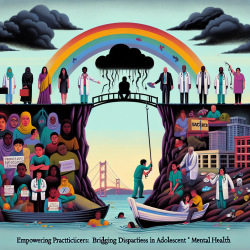Introduction
In today's rapidly evolving world, practitioners in speech-language pathology and related fields must stay informed about the latest research to create optimal outcomes for children. A recent study titled Heightened immigration enforcement impacts US citizens’ birth outcomes: Evidence from early ICE interventions in North Carolina provides valuable insights into how immigration policies can affect birth outcomes, which in turn can influence a child's developmental trajectory. This blog post aims to guide practitioners in leveraging these findings to enhance their practice and encourage further research.
Understanding the Research
The study conducted by Tome et al. (2021) explores the impact of increased Immigration and Customs Enforcement (ICE) activities on newborn health and prenatal care utilization in North Carolina. The researchers found that the introduction of the 287(g) program, which allows local law enforcement to act as ICE agents, led to a decrease in birth weight by approximately 58.54 grams. This reduction in birth weight is significant as it can have long-term implications on a child's health, education, and economic outcomes.
Implications for Practitioners
As practitioners focused on creating positive outcomes for children, understanding the broader social determinants of health is crucial. The findings of this study highlight the importance of considering environmental stressors, such as immigration enforcement, when assessing and planning interventions for children. Here are some actionable steps practitioners can take:
- Advocate for Comprehensive Care: Collaborate with healthcare providers to ensure that families affected by immigration policies have access to comprehensive prenatal and postnatal care. This includes advocating for policies that protect immigrant families' access to healthcare services.
- Incorporate Social Context into Assessments: When assessing a child's developmental needs, consider the family's social and economic context, including any stressors related to immigration enforcement.
- Engage in Community Outreach: Work with community organizations to provide support and resources to families affected by immigration policies. This can include educational workshops, support groups, and access to mental health services.
- Encourage Further Research: The study by Tome et al. underscores the need for continued research into the long-term effects of immigration policies on child development. Practitioners can contribute by participating in or supporting research initiatives that explore these impacts.
Encouraging Further Research
While the study provides valuable insights, it also opens the door for further exploration. Practitioners can play a vital role in advancing research by collaborating with academic institutions and contributing their clinical expertise. Areas for future research could include:
- Longitudinal studies examining the developmental outcomes of children born under heightened immigration enforcement conditions.
- Research into effective interventions that mitigate the negative impacts of environmental stressors on child development.
- Studies exploring the role of community support systems in enhancing resilience among affected families.
Conclusion
The study on immigration enforcement and birth outcomes provides a compelling case for the integration of social determinants into clinical practice. By understanding and addressing the broader environmental factors affecting child development, practitioners can make data-driven decisions that lead to better outcomes for children. To read the original research paper, please follow this link: Heightened immigration enforcement impacts US citizens’ birth outcomes: Evidence from early ICE interventions in North Carolina.










